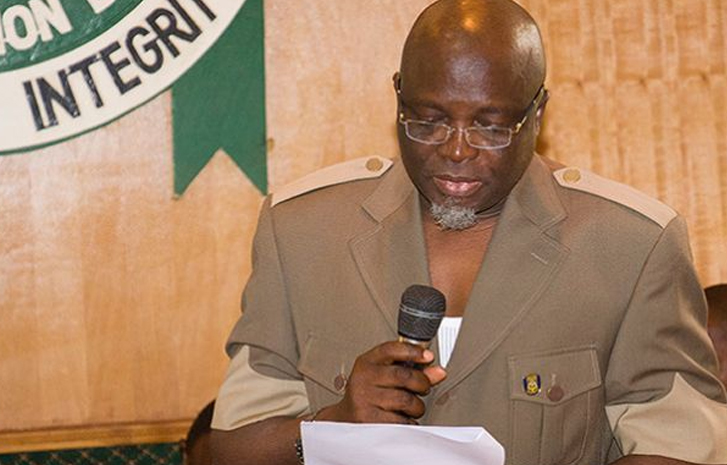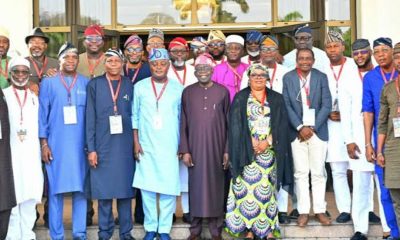Education
JAMB directs UTME candidates to start printing notification slips April 30

The Joint Admissions and Matriculation Board (JAMB) has directed all candidates who registered for the 2022 Unified Tertiary Matriculation Examination (UTME) to start printing their notification slips from Saturday, 30th April, 2022.
The board directed candidates to visit its website: https://www.jamb.gov.ng to print the slip.
The Director, Information Technology Services, Fabian Okoro, gave this in a statement by Fabian Benjamin, Head, Public Affairs and Protocol at JAMB Headquarters, Abuja.
According to the statement, the 2022 UTME notification slip is available for printing by all candidates who have registered for the 2022 UTME scheduled to hold from Friday, 6th May, 2022 to 14th May, 2022.
Education
New Zealand university offers up to $10,000 scholarship for international students

New Zealand university offers up to $10,000 scholarship for international students
Victoria University of Wellington in New Zealand, is offering the Tongarewa International Scholarship, which provides financial assistance of up to $10,000 to international students for their first year of study.
The scholarship seeks to support students in covering part of their tuition fees at the university.
The Tongarewa International Scholarship is available to international students starting their studies at Victoria University of Wellington in Trimester 2 or Trimester 3 of 2025.
This partial fee-based scholarship is open to both undergraduate and postgraduate students, offering a maximum award of $10,000.
“This is a partial fee-based scholarship that will go towards tuition fees for one year of study. It is designed for new international students, who are entering their first year of undergraduate or postgraduate studies at Victoria University of Wellington,” the institution informs.
“Scholarships are awarded competitively on the basis of academic excellence”
Eligibility criteria for the scholarship
To be eligible for the Tongarewa International Scholarship, applicants must:
- Be new international students
- Students must also hold a Conditional or Unconditional Offer of Place for an eligible program at Victoria University of Wellington
- New students to Victoria University of Wellington
- Selected by the scholarship award panel (upon scholarship application)
READ ALSO:
- China hosts Iran, Russia for nuclear talks
- Tinubu backs Obasa to remain Lagos speaker, ends assembly crisis
- Court bans viewing of controversial film, ‘Gang of Lagos’
Applicants are not eligible for this scholarship if they:
- Completed their secondary education at a New Zealand school;
- Completed the English for Academic Purposes (EAP) or the Victoria University of Wellington Foundation Studies programme;
- Are a Study Abroad or Exchange student or a Twinning student from one of the institution’s overseas partner universities;
- Are in their second trimester or year of study in the same degree programme (returning students) at Victoria University of Wellington
Application process
Students interested in applying for the scholarship must submit an application demonstrating academic achievement and leadership potential.
Scholarship requirements
The following documentation must be provided as part of the online scholarship application:
- A personal statement of up to 500 words outlining why the applicant wishes to study at Victoria University of Wellington, their academic goals and why they merit the scholarship
- Applicants should also include any leadership positions and details of their involvement in their school or community
According to the institution, “this is a partial fee-based scholarship which is awarded competitively based on academic excellence and the student’s personal statement. A panel comprising appropriate Wellington University International staff will review the applications and award the scholarships.”
Details further inform that the amount of the stipend will be awarded as either $2,500; $5,000; $7,500 or $10,000.
The scholarship amount, according to the institution, will be credited to students’ accounts two weeks after the programme begins. It cannot be paid out before this date.
Once the scholarship is awarded, the decision is final and cannot be appealed.
“Should the recipient withdraw from Victoria University of Wellington during the tenure of this scholarship or fail to achieve satisfactory progress, partial repayment of the Scholarship will normally be expected. Recipients must advise the Scholarships Office if they intend to withdraw,” the institution states.
Important deadlines
The deadline to apply for the scholarship is May 1st, 2025 for Trimester 2 and 1 August 2025 for Trimester 3. Applications must be submitted on the respective deadline dates.
For more details or to apply, students can visit the Victoria University of Wellington website.
New Zealand university offers up to $10,000 scholarship for international students
Education
One of 5 applying for students loan is female – NELFUND

One of 5 applying for students loan is female – NELFUND
The Nigerian Education Loan Fund (NELFUND) has reported that male students are applying for the Federal Government’s zero-interest education loans at a 4:1 ratio compared to female students, urging more female students to take advantage of the initiative to bridge the gap.
The Managing Director of NELFUND, Mr. Akintunde Sawyerr, made this known during the NELFUND Women Forum Programme in Abuja on Monday, in celebration of the 2025 International Women’s Day (IWD).
He was represented by Ms. Oluwatosin Sanusi, NELFUND’s Head of Investments and Funds Management.
Sawyerr pointed out that female students were not utilizing the loan opportunities as much as their male counterparts. The ratio of female applicants to male applicants is 1:4, a figure he described as unimpressive.
“The NELFUND initiative is all about providing loans for students in tertiary institutions, to pay for their fees and to take care of their welfare.
“Currently we have a ratio of 4 to 1, which means for every four male applicants, we have just one female, which isn’t impressive.”
To address the low participation rate, Sawyerr stated that NELFUND was collaborating with women stakeholders to increase awareness of the loan initiative and its benefits.
READ ALSO:
- APC council chairmanship aspirant hacked to death in Lagos
- Tinubu: Fuel subsidy removal aimed at securing future for unborn generations
- Elon Musk confirms massive cyberattack on X traced to Ukraine
However, he also stressed that loan repayment was crucial for the sustainability of the programme.
“Timely repayment would allow for the expansion of the initiative, enabling more students across all government-owned institutions to benefit,” he noted.
He further clarified that the education loan was accessible to students at various levels in universities and polytechnics within federal and state-owned institutions, while the skill acquisition loan extended beyond tertiary students.
Minister of State for Education, Dr. Suwaiba Ahmed, praised the Federal Government’s commitment to gender equity and urged female students to seize educational opportunities. Represented by Dr. Mufida Hussain, she stressed the need for bold action to break barriers and highlighted government investments in gender-balanced initiatives to ensure financial constraints do not hinder girls’ education.
Ms. Choice Enebeli, the National President of Female Students of Nigeria, praised NELFUND’s efforts in advocating for more female applications.
“Women’s rights are human rights, and we must continue to strive for a world where women and girls have equal access to education, healthcare, economic opportunities, and leadership positions,” she said.
Enebeli pledged to spearhead an awareness campaign on the educational loan across the country to encourage more female students to apply.
Mrs. Chioma Nweze, Senior Special Assistant to the President on Community Engagement, encouraged female students to be proactive in seeking opportunities rather than waiting for them. She emphasized the importance of taking initiative and claiming available opportunities.
One of 5 applying for students loan is female – NELFUND
Education
Workers of Oyo tertiary institutions begin indefinite strike

Workers of Oyo tertiary institutions begin indefinite strike
Workers at five Oyo State government-owned tertiary institutions have begun an indefinite strike.
The workers, in a statement on Monday, noted that strike action became necessary due to non-payment of minimum wage and unresolved salary disputes.
The institutions involved are The Polytechnic, Ibadan; The Oke-Ogun Polytechnic, Saki; Adeseun Ogundoyin Polytechnic, Eruwa; Oyo State College of Agriculture and Technology, Igboora; and Oyo State College of Education, Lanlate.
READ ALSO:
- Lakurawa terrorists burn 7 Kebbi villages, 13 killed
- Over two million candidates register for 2025 UTME, JAMB closes registration
- Drunk police officer shoots man dead in Minna
The Joint Action Committee (JAC) stated that the decision to embark on strike came after extensive discussions among the unions.
It added that the strike was a necessary measure to urge the state government to fulfil its obligations.
It said, “Declaration of Indefinite Strike by the Joint Action Committee (JAC) of Oyo State-Owned Tertiary Institutions
“The Joint Action Committee (JAC), comprising 15 unions across the five state-owned tertiary institutions in Oyo State, hereby declares an indefinite strike action commencing on Monday, March 10, 2025.
“This decision was reached after extensive deliberations and consultations among the unions, following the inability of the management of the affected institutions to address the longstanding issues of non-implementation of the approved 25/35% salary increase being enjoyed by our colleagues in other institutions since January 2024 and the new minimum wage for workers in the Polytechnic and College of education sector.”
Workers of Oyo tertiary institutions begin indefinite strike
-

 metro1 day ago
metro1 day agoBREAKING: Appeal Court stops Sanusi’s reinstatement as Kano emir
-

 Entertainment3 days ago
Entertainment3 days agoCourt bans viewing of controversial film, ‘Gang of Lagos’
-

 Politics2 days ago
Politics2 days ago2027: Southern Kaduna group rejects El-Rufai, supports Tinubu
-

 News3 days ago
News3 days agoNigerian woman declared dead appears in UK court to reclaim her £350,000 home
-

 Opinion13 hours ago
Opinion13 hours agoNasir El-Rufai’s scorched-earth one-man opposition, By Farooq Kperogi
-

 Auto2 days ago
Auto2 days agoThree electric vehicles on display steal show at Lagos Motor Fair
-

 metro3 days ago
metro3 days agoTinubu backs Obasa to remain Lagos speaker, ends assembly crisis
-

 News3 days ago
News3 days agoNatasha: Senate writes IPU on her suspension





